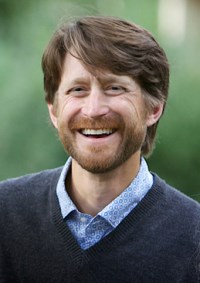This is the tenth and last in a series of candidate profiles written by students in Instructor Jeff Browne’s CU News Corps course at CU-Boulder. Lauren is studying for her master’s in journalism at CU-Boulder. She graduated from CU in 2011 with degrees in broadcast journalism, film studies, and international media. Maslen has lived, worked and studied internationally, most recently in Seoul, South Korea.
Andrew Shoemaker knows his priorities when it comes to Boulder City Council. A passionate Boulderite, having lived in the area for more than 10 years, Shoemaker is a no-nonsense local business owner, attorney, and father.
Shoemaker brought the USA Pro Challenge to Boulder in 2012. The race is the number one sports spectacle in Colorado and is viewed in more than 200 countries, he said. “It’s an advertisement for Boulder,” said Shoemaker. Of all of the issues that tear the community apart, the Pro Challenge is one that is able to “build consensus among Boulderites.”
Priorities in order
Shoemaker’s top priorities as a council candidate include improving public transportation. A bus system like the one serving Denver’s 16th Street Mall area, which allows free buses around the business district, would help develop Boulder businesses, Shoemaker said. By removing barriers to public transportation and increasing the ease with which people get on and off the bus at popular nodes in town, the thousands of people commuting to work in Boulder on a daily basis may be able to more easily take advantage of Boulder’s system. Local businesses could flourish.
Shoemaker knows that the 55,000 people commuting into Boulder on a daily basis is no small issue. He is aware of the interconnectedness of housing, behavioral problems along Boulder Creek and downtown, traffic, transportation, and how we can reduce fuel consumption. Addressing these issues will enhance the community and the local economy.
Former president of the Boulder Mountainbike Alliance Jason Vogel said that a small group within the community represents the whole when it comes to City Council. But Shoemaker, he said, knows how to represent everyone. “We need someone who can be a champion for these kinds of issues,” said Vogel. “Shoemaker is innovative… he is ambitious.”
What to do with the Hill?
Shoemaker and I met at one of University Hill’s bustling coffee shops, Innisfree Poetry Bookstore and Cafe.
The Hill area, where Shoemaker lives with his family, is an area of concern. It is dimly lit at night, often making pedestrians feel unsafe. Housing on the Hill appeals to the student population because of its proximity to campus. It is flush with classic sandwich shops and, more recently, pipe stores. These businesses, however, rent their spaces from out-0f-town property owners who charge high rents, says Shoemaker. The landlords don’t have an investment in the town and if their tenants’ businesses fail—not uncommon for the Hill—it’s not a big deal.
The Hill has great locally owned businesses, but it’s lacking in its ability to flourish as a Boulder business district, said Shoemaker. It doesn’t need to be, though; by incorporating a program like that implemented in Denver’s Theater District by David Ehrlich, the Hill may be able to change its course. Private funding and the arts can work together with local businesses to create a thriving environment and an artistic community: qualities Boulder has always been known for. Shoemaker says Boulder is diverse, and the Hill is a way to show this. The area doesn’t have the money flowing into it that the Pearl Street Mall does, but it has the students, the community, and it is a Boulder staple. “The Hill can be a thriving area if attention is invested into it,” said Shoemaker.
This is a sentiment that not only rings true for an important Boulder node like the Hill, but for the city as a whole.






 (5 votes, average: 3.80 out of 5)
(5 votes, average: 3.80 out of 5)